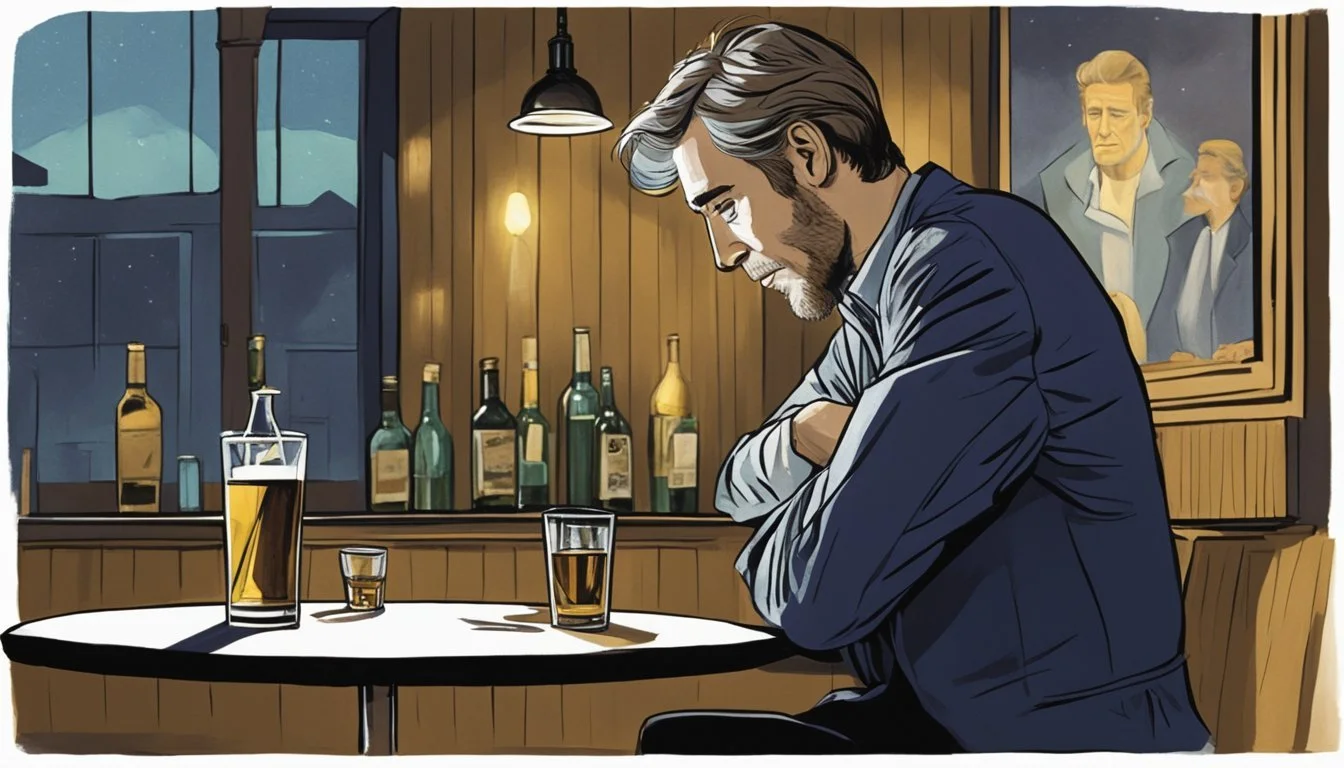Hollywood Heartthrob: Peter O'Toole's Battle with Depression and Alcoholism
A Star's Struggle Behind the Scenes
Peter O'Toole, the charismatic star of "Lawrence of Arabia," captivated audiences with his striking blue eyes and commanding screen presence. Behind the scenes, however, the acclaimed actor grappled with severe depression and alcoholism that threatened to derail his career and personal life.
O'Toole's legendary drinking habits often overshadowed his immense talent, leading him to show up on set intoxicated and engage in outrageous behavior off-camera. His battle with alcohol addiction spanned decades, impacting his relationships and health while simultaneously fueling his larger-than-life persona.
Despite his struggles, O'Toole managed to deliver powerful performances throughout his career, earning eight Academy Award nominations. His journey through the depths of addiction and mental health challenges offers a poignant look at the dark side of fame and the resilience of the human spirit.
Peter O'Toole: An Accomplished Actor
Peter O'Toole's talent and charisma made him one of the most acclaimed actors of his generation. His career spanned decades and included numerous iconic roles on stage and screen.
Early Life and Entrance into Acting
Peter O'Toole was born in 1932 in Leeds, England. He developed an interest in acting at a young age and began performing in local theater productions as a teenager.
In 1952, O'Toole enrolled at the prestigious Royal Academy of Dramatic Art (RADA) in London. There, he honed his craft and performed in several Shakespeare plays.
After graduating from RADA in 1954, O'Toole joined the Bristol Old Vic theater company. He quickly gained recognition for his powerful stage presence and commanding voice.
Rise to Stardom in 'Lawrence of Arabia'
O'Toole's breakthrough came in 1962 when he was cast as T.E. Lawrence in David Lean's epic film "Lawrence of Arabia." His electrifying performance as the enigmatic British officer catapulted him to international stardom.
The role earned O'Toole his first Academy Award nomination for Best Actor. Though he didn't win, the film was a massive critical and commercial success.
"Lawrence of Arabia" established O'Toole as a leading man in Hollywood. His piercing blue eyes and charismatic screen presence made him an instant heartthrob.
Iconic Roles and Oscar Nominations
Following "Lawrence of Arabia," O'Toole took on a series of memorable roles that showcased his versatility as an actor. He portrayed King Henry II twice - in "Becket" (1964) and "The Lion in Winter" (1968).
O'Toole received Oscar nominations for both performances. He earned additional nominations for "Goodbye, Mr. Chips" (1969), "The Ruling Class" (1972), "The Stunt Man" (1980), and "My Favorite Year" (1982).
His final Oscar nomination came for "Venus" (2006), bringing his total to eight without a win. In 2003, O'Toole accepted an Honorary Academy Award for his lifetime of work in film.
Personal Life of the Legend
Peter O'Toole's personal life was marked by passionate relationships and close friendships in the entertainment world. His charismatic personality attracted both romantic partners and industry colleagues.
Relationships and Family
Peter O'Toole married actress Siân Phillips in 1959. The couple had two daughters, Kate and Patricia. Their marriage lasted 20 years before ending in divorce in 1979.
After his divorce, O'Toole had a son named Lorcan with model Karen Brown.
O'Toole's charm and wit made him popular with women, but his relationships were often complicated by his struggles with alcohol.
Friendships within the Film Industry
O'Toole formed close bonds with fellow actors Richard Burton and Richard Harris. The trio was known for their heavy drinking and wild antics off-screen.
He also developed a friendship with Oliver Reed, another actor famous for his hell-raising behavior.
These friendships were characterized by a shared love of acting, partying, and pushing boundaries. O'Toole's camaraderie with his fellow actors often extended beyond film sets into their personal lives.
Struggles Behind the Fame
Peter O'Toole's legendary career was marked by incredible highs on screen and painful lows off-camera. His battles with alcohol, depression, and health issues cast a shadow over his immense talent and fame.
The Battle with Alcoholism
O'Toole's heavy drinking became notorious in Hollywood. He often appeared on set intoxicated, causing production delays and conflicts with colleagues. His alcohol consumption reached dangerous levels, with reports of drinking two or three bottles of vodka daily.
In 1975, O'Toole underwent surgery to remove part of his pancreas and intestines due to alcohol-related issues. This health scare prompted him to quit drinking for a time, though he later relapsed.
O'Toole's alcoholism strained his relationships and impacted his career. He missed out on potential roles and faced criticism for erratic behavior. Despite these struggles, he continued to deliver powerful performances when sober.
Depression Throughout His Career
O'Toole grappled with depression for much of his life. The pressures of fame and his tumultuous personal life contributed to his mental health challenges. He often withdrew from public life during depressive episodes.
The actor's mood swings and unpredictable behavior were well-documented. Colleagues noted his brilliant wit could quickly turn to melancholy. O'Toole rarely spoke publicly about his depression, but its impact was evident in his personal writings and interviews.
His struggles with depression and alcohol often intertwined, creating a vicious cycle that was difficult to break. Despite these challenges, O'Toole continued to work, using acting as a form of therapy.
Physical Health and Stomach Cancer
In addition to alcohol-related health issues, O'Toole faced a battle with stomach cancer in the 1970s. He underwent surgery and treatment, which forced him to take a break from acting.
The cancer diagnosis came as a shock to fans and colleagues alike. O'Toole's weight loss and gaunt appearance during this period were stark reminders of his health struggles.
After recovering, O'Toole returned to acting with renewed vigor. However, the physical toll of his past excesses and health issues remained evident. He required ongoing medical care and faced additional health challenges in his later years.
Late Career and Acclaimed Performances
Peter O'Toole's later years brought prestigious awards and memorable roles. He continued to captivate audiences with his talent and charisma well into his seventies and eighties.
Honorary Awards and Recognition
In 2003, Peter O'Toole received an Honorary Oscar for his lifetime contribution to cinema. The Academy celebrated his remarkable body of work spanning five decades.
O'Toole initially declined the award, feeling he was "still in the game." He later accepted, delivering a touching speech that highlighted his enduring passion for acting.
His performances in "Venus" (2006) and "The Lion in Winter" (1968) earned him additional Oscar nominations. These roles showcased O'Toole's versatility and enduring appeal as an actor in his twilight years.
Noteworthy Films and Television Roles
O'Toole's portrayal of Alan Swann in "My Favorite Year" (1982) stands out as one of his most beloved performances. The role earned him critical acclaim and another Academy Award nomination.
In "The Last Emperor" (1987), O'Toole played Reginald Johnston, tutor to the young Chinese emperor. His nuanced performance added depth to the epic historical drama.
O'Toole lent his distinctive voice to the animated film "Ratatouille" (2007). As the food critic Anton Ego, he delivered a memorable monologue that resonated with audiences and critics alike.
His final film role in "Katherine of Alexandria" (2014) capped off a legendary career filled with unforgettable characters and performances.
Cultural Impact and Legacy
Peter O'Toole's influence on cinema and theater extended far beyond his own performances. His unique style and commanding presence left an indelible mark on Hollywood and inspired generations of actors.
Influence on Upcoming Actors and Hollywood
O'Toole's dedication to his craft set a high standard for aspiring actors. His ability to fully embody complex characters inspired many to pursue method acting techniques.
Young performers studied his nuanced portrayals in films like "Lawrence of Arabia" and "The Lion in Winter" to improve their own skills. O'Toole's commitment to theater alongside film work demonstrated the value of a diverse acting portfolio.
His eight Oscar nominations without a win became legendary in Hollywood. This streak highlighted the sometimes arbitrary nature of awards in the face of consistent excellence.
Memorable Performances on Stage and Screen
O'Toole's versatility shone through his work in both classical and contemporary roles. His portrayal of T.E. Lawrence in David Lean's epic remains a masterclass in character development.
On stage, O'Toole's Macbeth and his performance in "Jeffrey Bernard is Unwell" showcased his theatrical prowess. These roles cemented his status as a titan of British theater.
His turn as Priam in "Troy" introduced him to a new generation of moviegoers. Even in supporting roles, O'Toole commanded attention with his magnetic screen presence.
Despite controversy, his portrayal of the mad emperor in "Caligula" demonstrated his willingness to take on challenging and unconventional parts.



